Charles E W Bean, Diaries, AWM38 3DRL 606/255/1 - 1916 - 1937 - Part 8
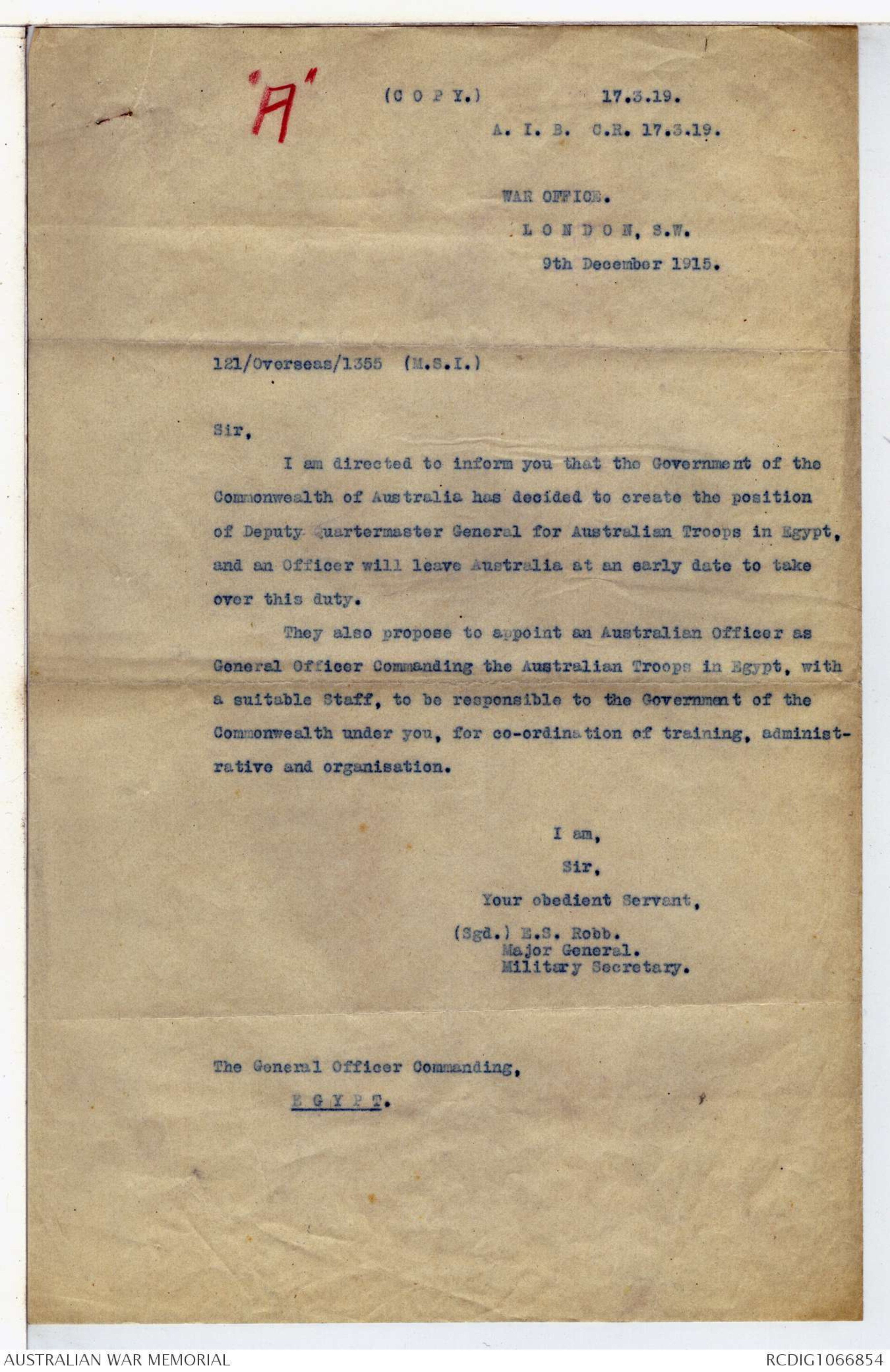
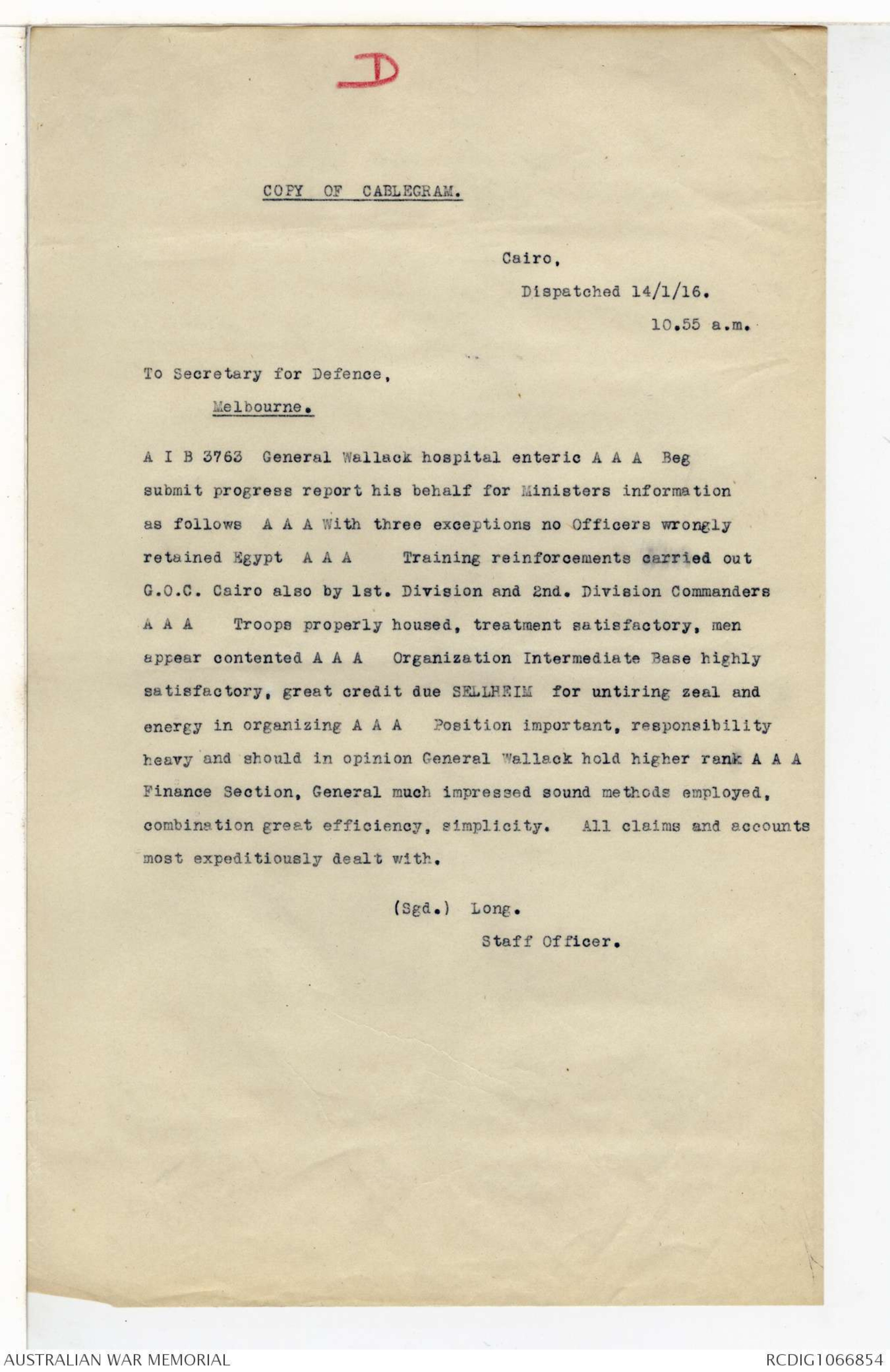
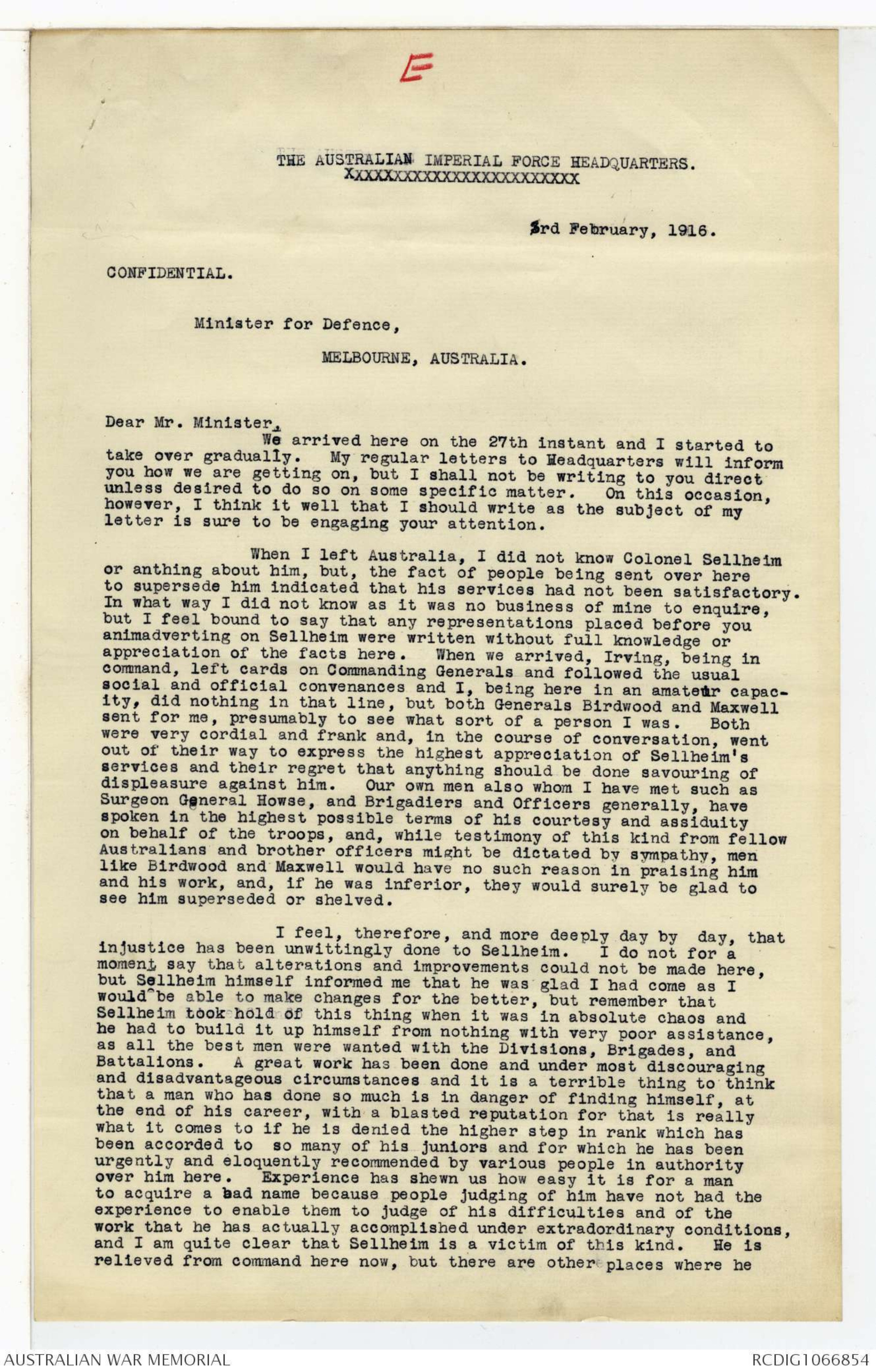
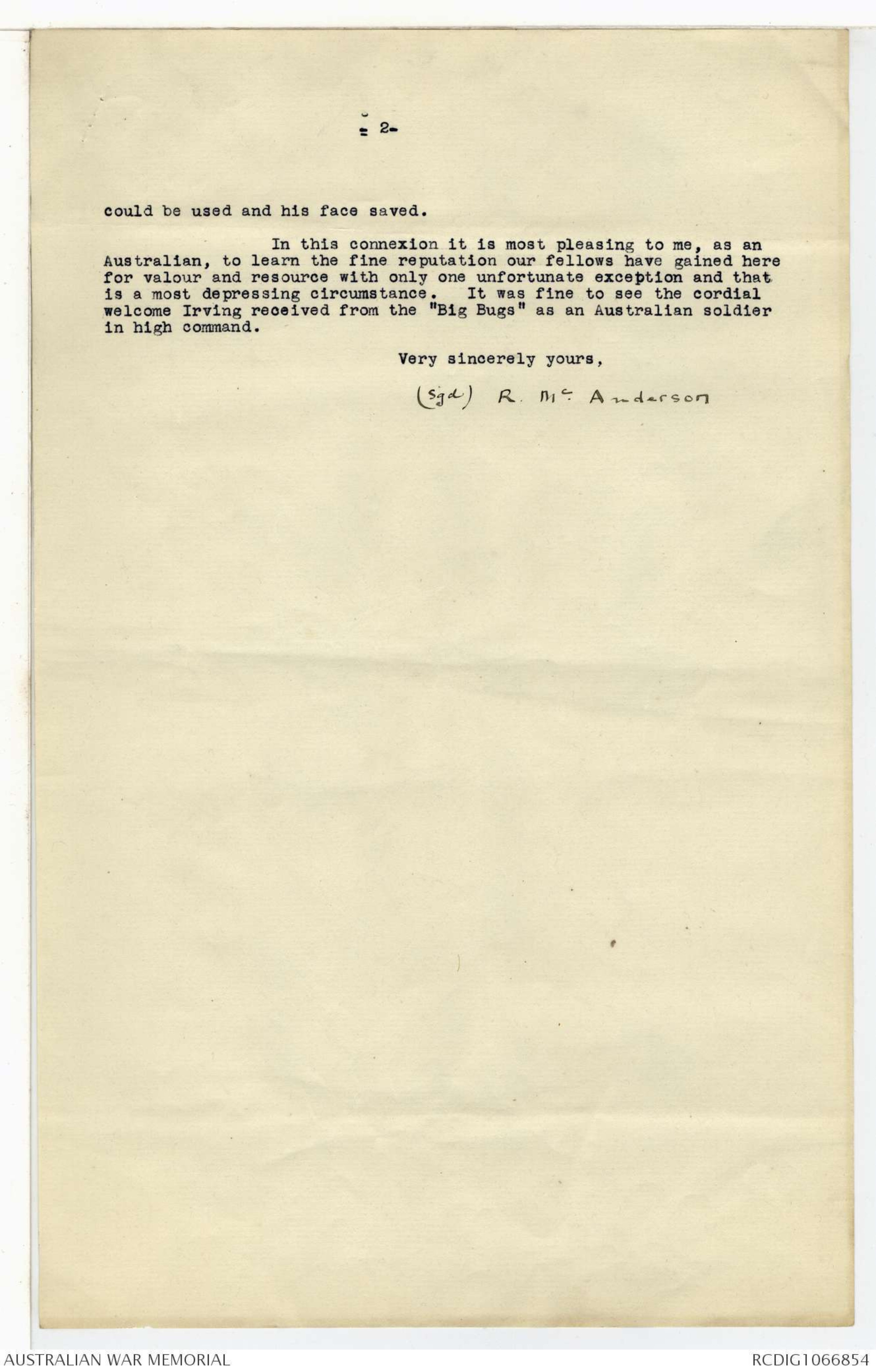
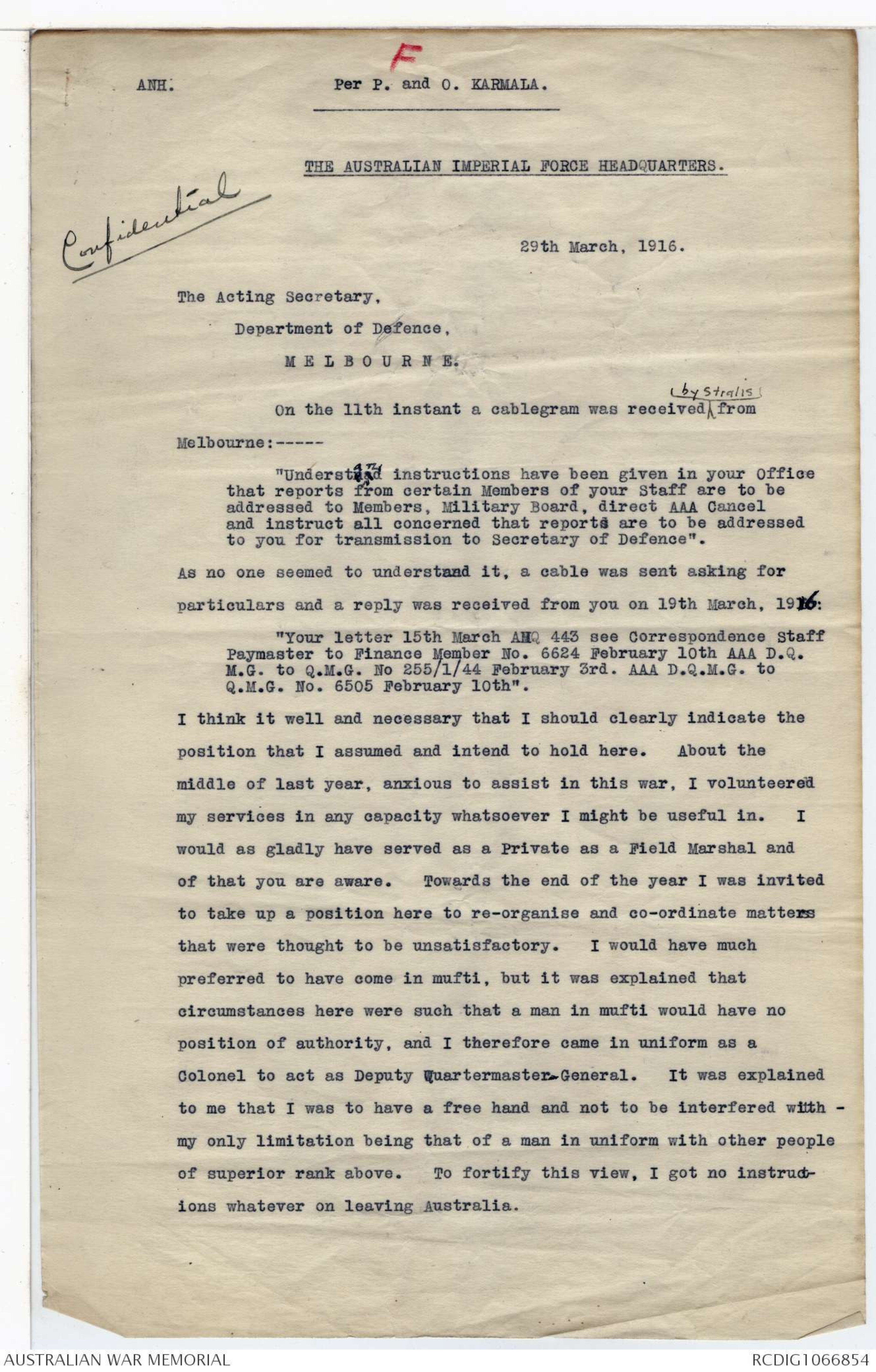
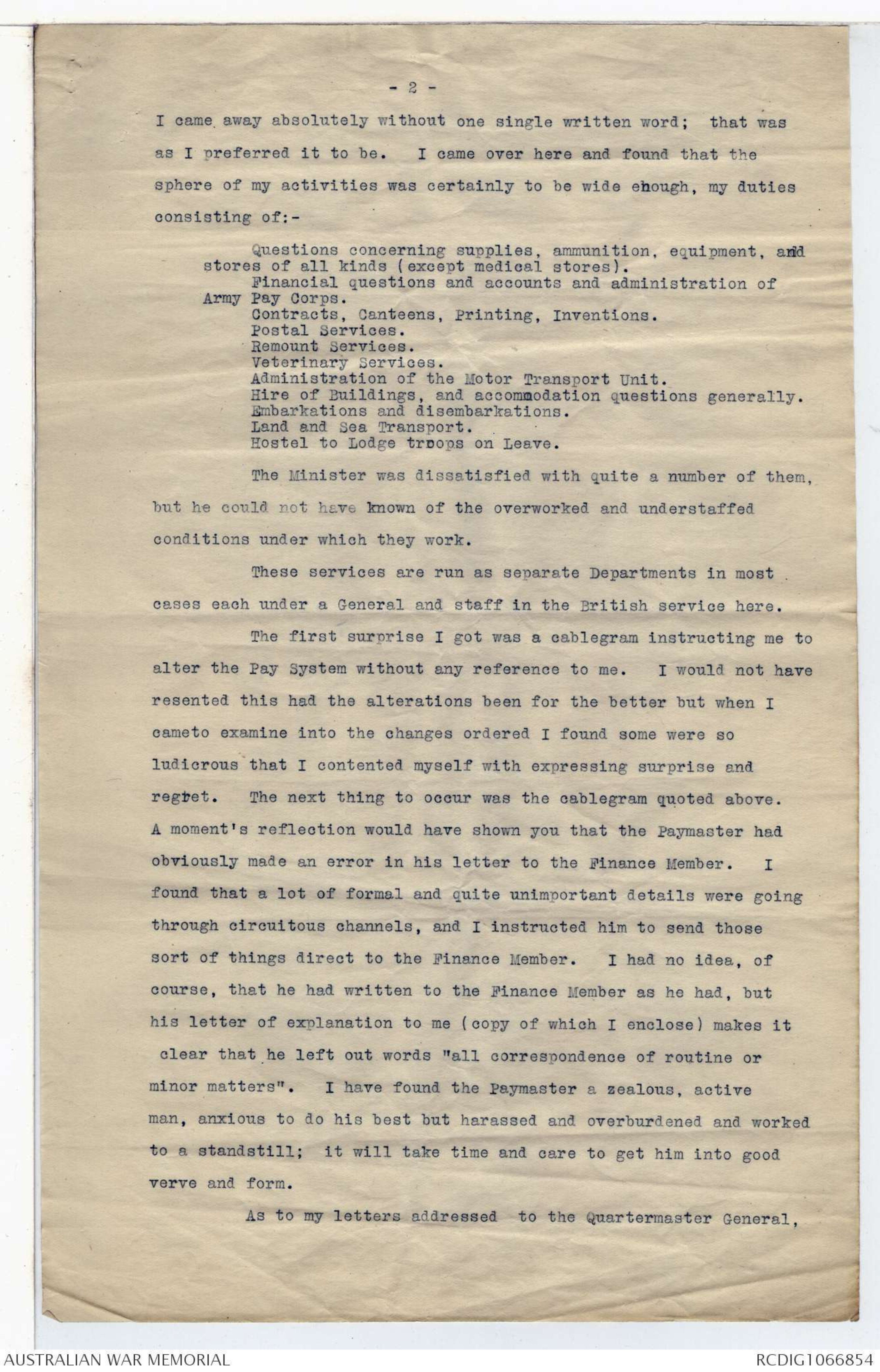
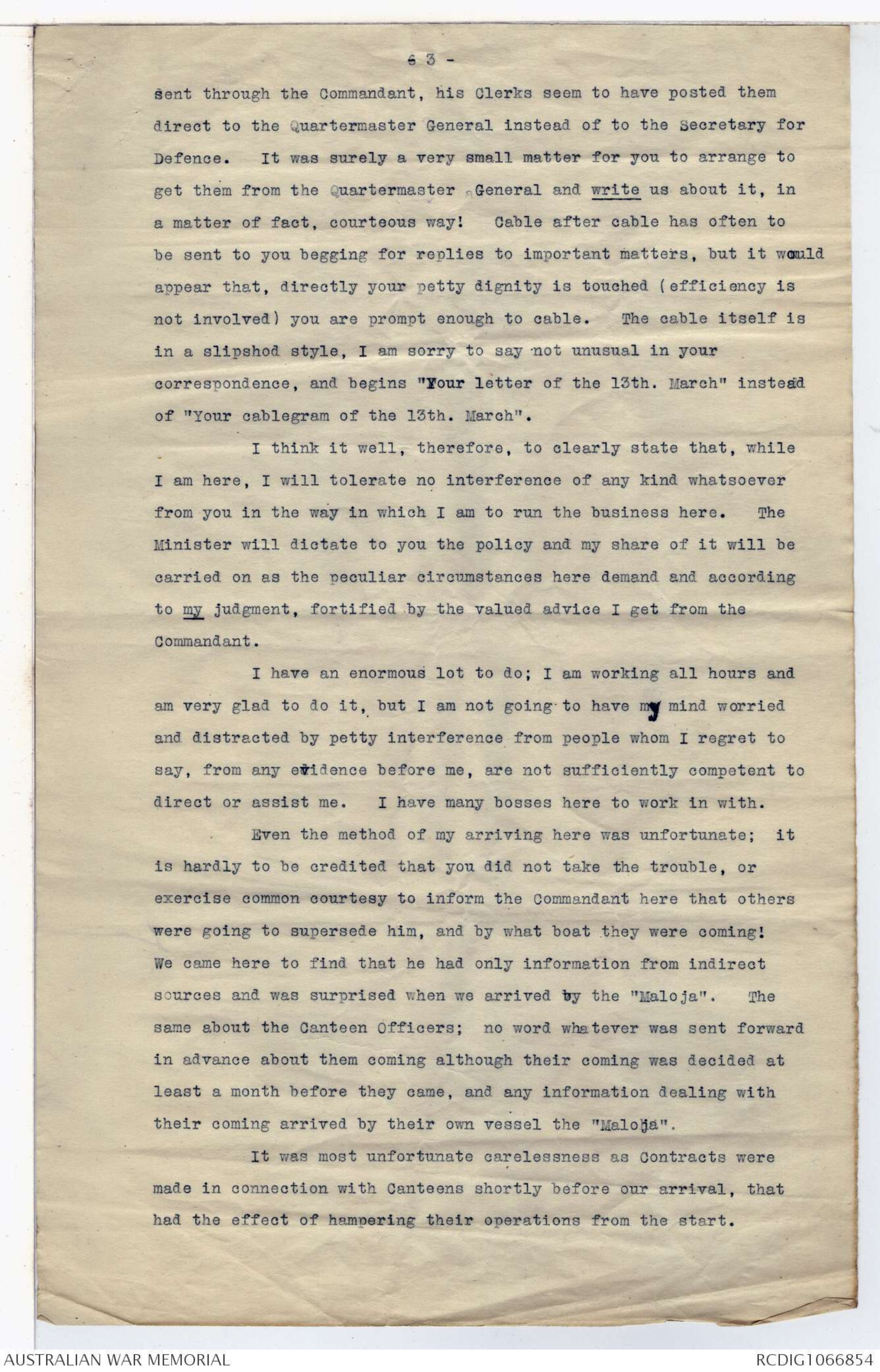
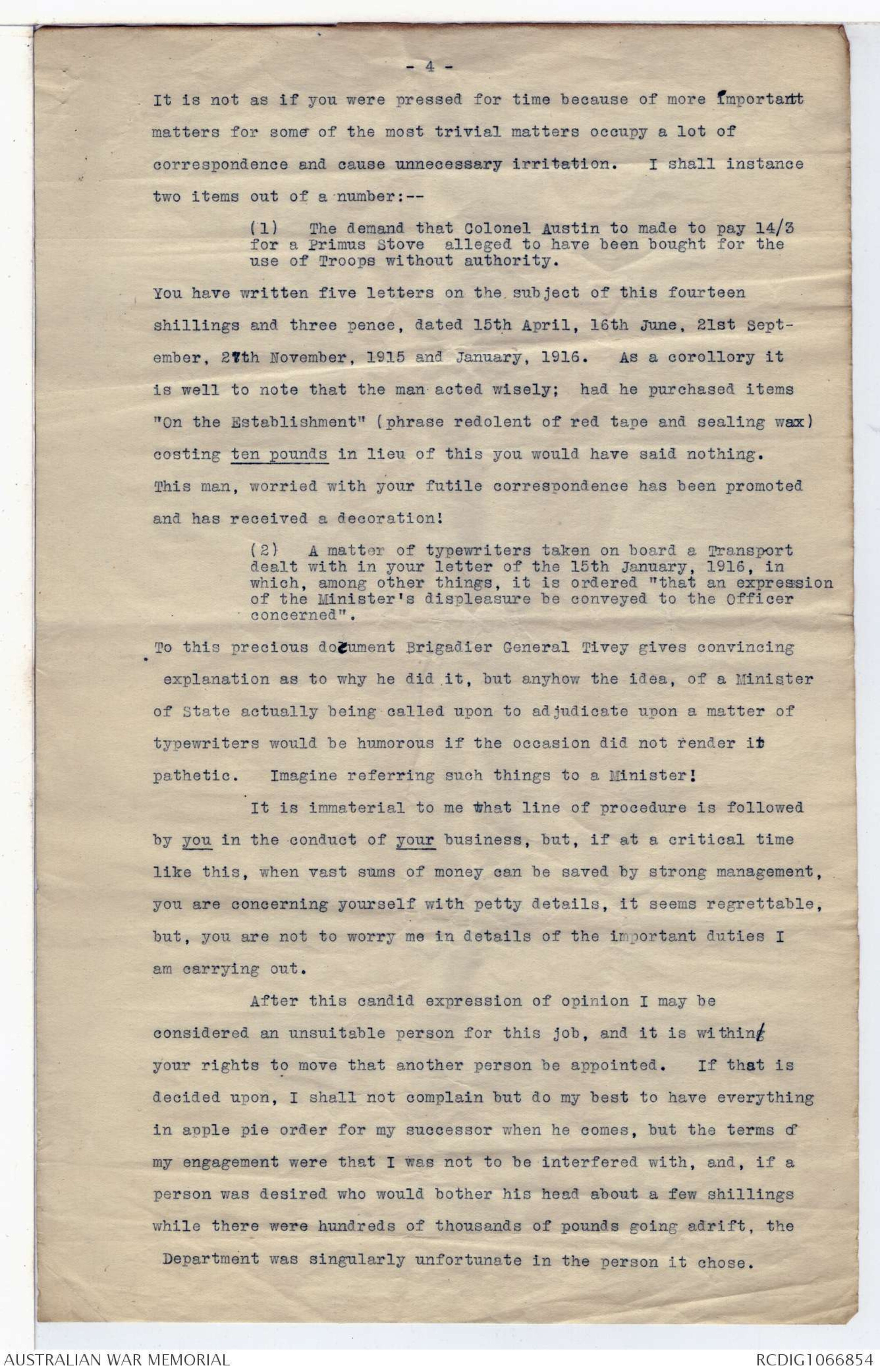
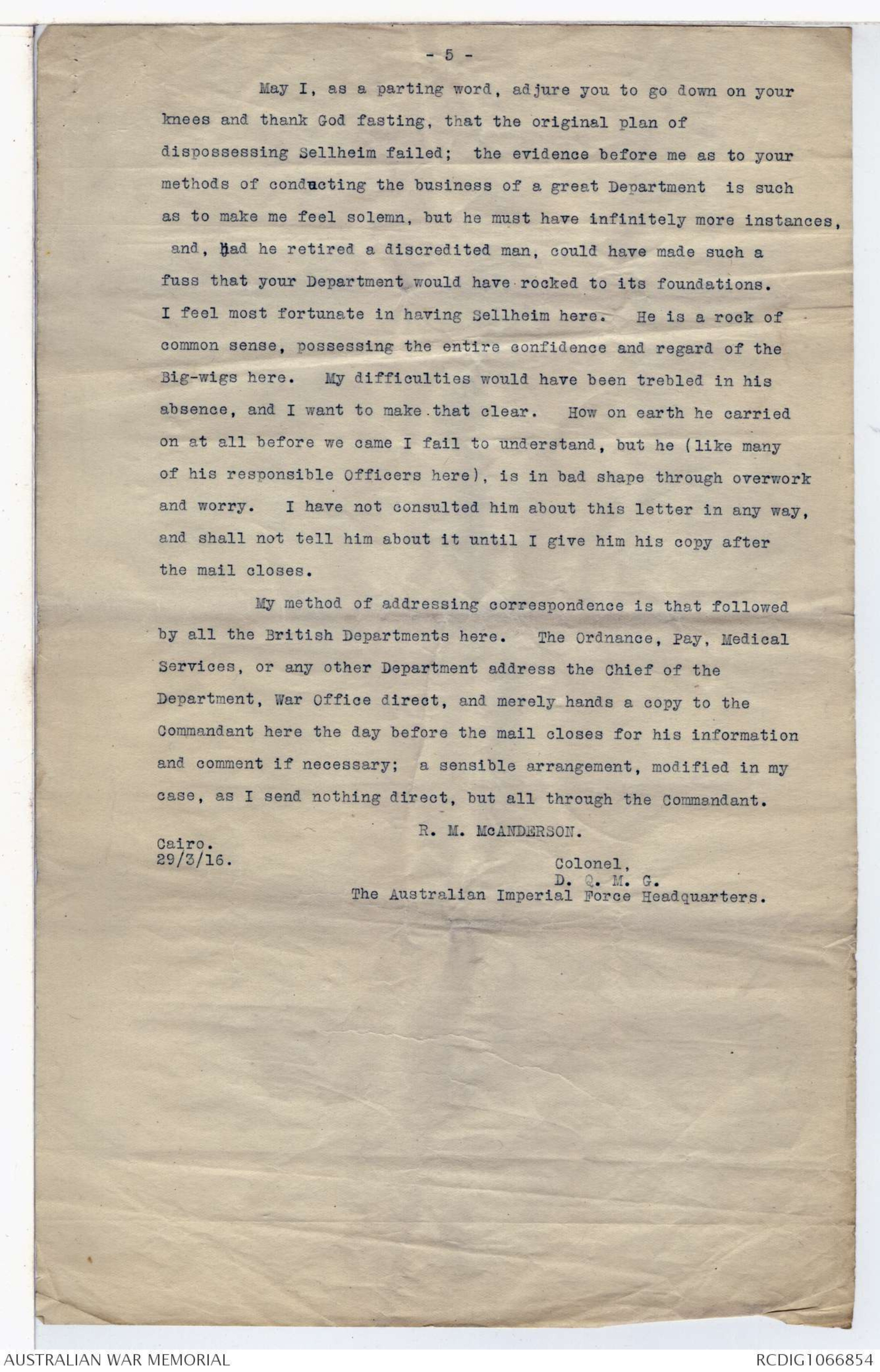
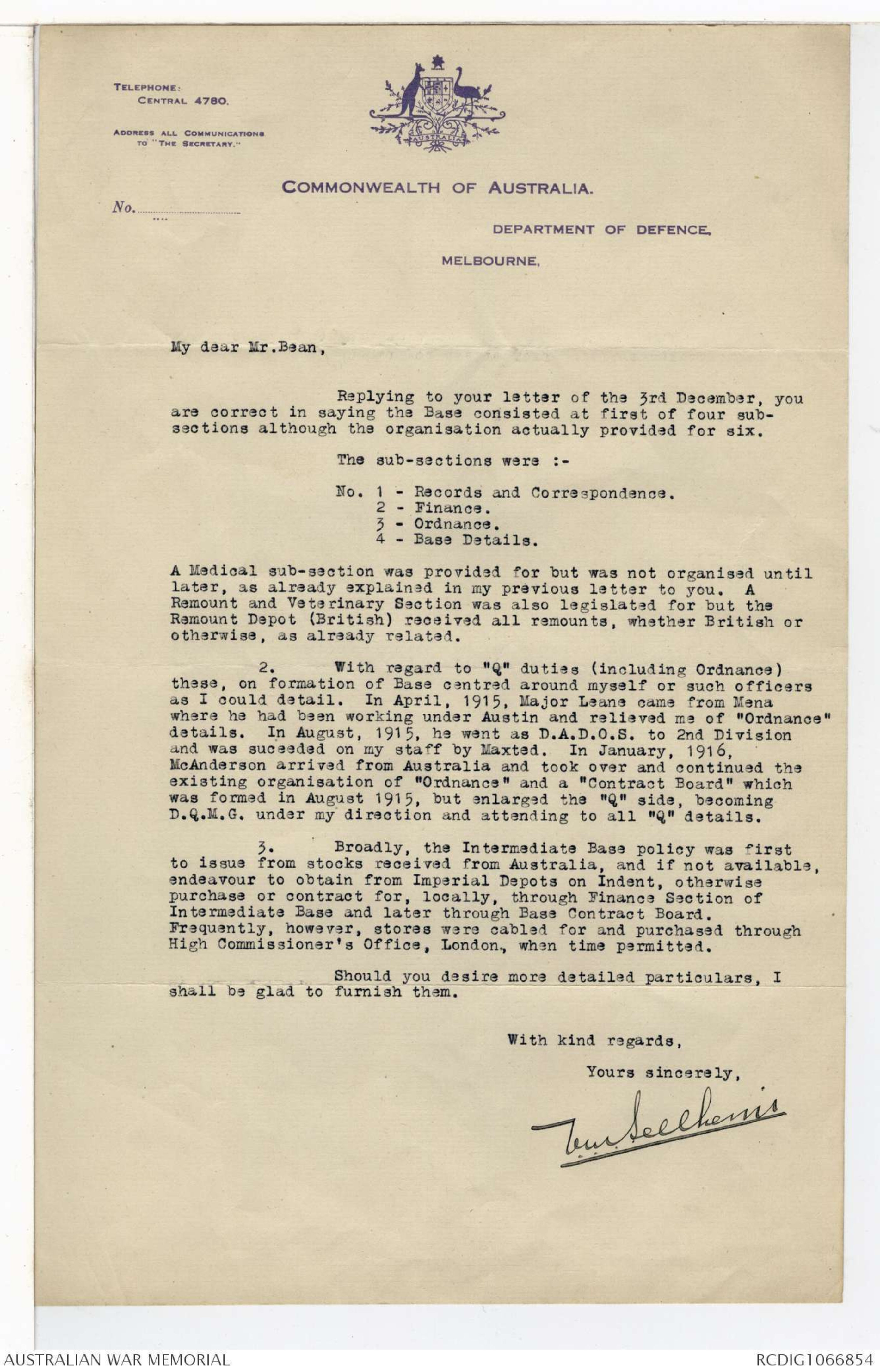
"A"
(COPY) 17.3.19.
A. I. B. C.R. 17.3.19.
WAR OFFICE.
L O N D O N. S.W.
9th December 1915.
121/Overseas/1335 (M.S.I.)
Sir,
I am directed to inform you That the Government of the
Commonwealth of Australia has decided to create the position
of Deputy Quartermaster General for Australian Troops in Egypt,
and an Officer will leave Australia at an early date to take
over this duty.
They also propose to appoint an Australian Officer as
General Officer Commanding the Australian Troops in Egypt, with
a suitable Staff, to be responsible to the Government of the
Commonwealth under you, for co-ordination of training, administrative
and organisation.
I am,
Sir.
Your obedient Servant,
(Sgd.) E.S. Robb.
Major General.
Military Secretary.
The General Officer Commanding,
EGYPT.
D
COPY OF CABLEGRAM.
Cairo,
Dispatched 14/1/16.
10.55 a.m.
To Secretary for Defence,
Melbourne.
A I B 3763 General Wallack hospital enteric A A A Beg
submit progress report his behalf for Ministers information
as follows A A A With three exceptions no Officers wrongly
retained Egypt A A A Training reinforcements carried out
G.O.C. Cairo also by 1st. Division and 2nd. Division Commanders
A A A Troops properly housed, treatment satisfactory, men
appear contented A A A Organization Intermediate Base highly
satisfactory, great credit due SELLHEIM for untiring zeal and
energy in organizing A A A Position important, responsibility
heavy and should in opinion General Wallack hold higher rank A A A
Finance Section, General much impressed sound methods employed,
combination great efficiency, simplicity. All claims and accounts
most expeditiously dealt with.
(Sgd.) Long.
Staff Officer.
E
THE AUSTRALIAN IMPERIAL FORCE HEADQUARTERS.
XXXXXXXXXXXXXXXXXXXXX
3rd February, 1916.
CONFIDENTIAL.
Minister for Defence,
MELBOURNE, AUSTRALIA.
Dear Mr. Minister
We arrived here on the 27th instant and I started to
take over gradually. My regular letters to Headquarters will inform
you how we are getting on, but I shall not be writing to you direct
unless desired to do so on some specific matter. On this occasion,
however, I think it well that I should write as the subject of my
letter is sure to be engaging your attention.
When I left Australia, I did not know Colonel Sellheim
or anthing about him, but, the fact of people being sent over here
to supersede him indicated that his services had not been satisfactory.
In what way I did not know as it was no business of mine to enquire,
but I feel bound to say that any representations placed before you
animadverting on Sellheim were written without full knowledge or
appreciation of the facts here. When we arrived, Irving, being in
command, left cards on Commanding Generals and followed the usual
social and official convenances and I, being here in an amateur capacity,
did nothing in that line, but both Generals Birdwood and Maxwell
sent for me, presumably to see what sort of a person I was. Both
were very cordial and frank and, in the course of conversation, went
out of their way to express the highest appreciation of Sellheim's
services and their regret that anything should be done savouring of
displeasure against him. Our own men also whom I have met such as
Surgeon General Howse, and Brigadiers and Officers generally, have
spoken in the highest possible terms of his courtesy and assiduity
on behalf of the troops, and, while testimony of this kind from fellow
Australians and brother officers might be dictated by sympathy, men
like Birdwood and Maxwell would have no such reason in praising him
and his work, and, if he was inferior, they would surely be glad to
see him superseded or shelved.
I feel, therefore, and more deeply day by day, that
injustice has been unwittingly done to Sellheim. I do not for a
moment say that alterations and improvements could not be made here,
but Sellheim himself informed me that he was glad I had come as I
would be able to make changes for the better, but remember that
Sellheim took hold of this thing when it was in absolute chaos and
he had to build it up himself from nothing with very poor assistance,
as all the best men were wanted with the Divisions, Brigades, and
Battalions. A great work has been done and under most discouraging
and disadvantageous circumstances and it is a terrible thing to think
that a man who has done so much is in danger of finding himself, at
the end of his career, with a blasted reputation for that is really
what it comes to if he is denied the higher step in rank which has
been accorded to so many of his juniors and for which he has been
urgently and eloquently recommended by various people in authority
over him here. Experience has shewn us how easy it is for a man
to acquire a bad name because people judging of him have not had the
experience to enable them to judge of his difficulties and of the
work that he has actually accomplished under extradordinary conditions,
and I am quite clear that Sellheim is a victim of this kind. He is
relieved from command here now, but there are other places where he
-2-
could be used and his face saved.
In this connexion it is most pleasing to me, as an
Australian, to learn the fine reputation our fellows have gained here
for valour and resource with only one unfortunate exception and that
is a most depressing circumstance. It was fine to see the cordial
welcome Irving received from the "Big Bugs" as an Australian soldier
in high command.
Very sincerely yours,
(Sgd) R. Mc Anderson
F
ANH. Per P. and O. KARMALA.
THE AUSTRALIAN IMPERIAL FORCE HEADQUARTERS.
[*Confidential*]
29th March, 1916.
The Acting Secretary,
Department of Defence,
ME L B O UR N E:
On the 11th instant a cablegram was received ^by Stralis from
Melbourne:-----
"Understand instructions have been given in your Office
that reports from certain Members of your Staff are to be
addressed to Members, Military Board, direct AAA Cancel
and instruct all concerned that reports are to be addressed
to you for transmission to Secretary of Defence".
As no one seemed to understand it, a cable was sent asking for
particulars and a reply was received from you on 19th March, 1916:
"Your letter 15th March AHQ 443 see Correspondence Staff
Paymaster to Finance Member No. 6624 February 10th AAA D.Q.
M.G. to Q.M.G. No 255/1/44 February 3rd. AAA D.Q.M.G. to
Q.M.G. No. 6505 February 10th".
I think it well and necessary that I should clearly indicate the
position that I assumed and intend to hold here. About the
middle of last year, anxious to assist in this war, I volunteered
my services in any capacity whatsoever I might be useful in. I
would as gladly have served as a Private as a Field Marshal and
of that you are aware. Towards the end of the year I was invited
to take up a position here to re-organise and co-ordinate matters
that were thought to be unsatisfactory. I would have much
preferred to have come in mufti, but it was explained that
circumstances here were such that a man in mufti would have no
position of authority, and I therefore came in uniform as a
Colonel to act as Deputy Quartermaster-General. It was explained
to me that I was to have a free hand and not to be interfered with -
my only limitation being that of a man in uniform with other people
of superior rank above. To fortify this view, I got no instructions
whatever on leaving Australia.
- 2 -
I came away absolutely without one single written word; that was
as I preferred it to be. I came over here and found that the
sphere of my activities was certainly to be wide enough, my duties
consisting of:-
Questions concerning supplies, ammunition, equipment, and
stores of all kinds (except medical stores).
Financial questions and accounts and administration of
Army Pay Corps.
Contracts, Canteens, Printing, Inventions.
Postal Services.
Remount Services.
Veterinary Services.
Administration of the Motor Transport Unit.
Hire of Buildings, and accommodation questions generally.
Embarkations and disembarkations.
Land and Sea Transport.
Hostel to Lodge troops on Leave.
The Minister was dissatisfied with quite a number of them,
but he could not have known of the overworked and understaffed
conditions under which they work.
These services are run as separate Departments in most
cases each under a General and staff in the British service here.
The first surprise I got was a cablegram instructing me to
alter the Pay System without any reference to me. I would not have
resented this had the alterations been for the better but when I
cameto examine into the changes ordered I found some were so
ludicrous that I contented myself with expressing surprise and
regret. The next thing to occur was the cablegram quoted above.
A moment's reflection would have shown you that the Paymaster had
obviously made an error in his letter to the Finance Member. I
found that a lot of formal and quite unimportant details were going
through circuitous channels, and I instructed him to send those
sort of things direct to the Finance Member. I had no idea, of
course, that he had written to the Finance Member as he had, but
his letter of explanation to me (copy of which I enclose) makes it
clear that he left out words "all correspondence of routine or
minor matters". I have found the Paymaster a zealous, active
man, anxious to do his best but harassed and overburdened and worked
to a standstill; it will take time and care to get him into good
verve and form.
As to my letters addressed to the Quartermaster General,
-3-
sent through the Commandant, his Clerks seem to have posted them
direct to the Quartermaster General instead of to the Secretary for
Defence. It was surely a very small matter for you to arrange to
get them from the Quartermaster General and write us about it, in
a matter of fact, courteous way! Cable after cable has often to
be sent to you begging for replies to important matters, but it would
appear that, directly your petty dignity is touched (efficiency is
not involved) you are prompt enough to cable. The cable itself is
in a slipshod style, I am sorry to say not unusual in your
correspondence, and begins "Your letter of the 13th. March" instead
of "Your cablegram of the 13th. March".
I think it well, there fore, to clearly state that, while
I am here, I will tolerate no interference of any kind whatsoever
from you in the way in which I am to run the business here. The
Minister will dictate to you the policy and my share of it will be
carried on as the peculiar circumstances here demand and according
to my judgment, fortified by the valued advice I get from the
Commandant.
I have an enormous lot to do; I am working all hours and
am very glad to do it, but I am not going to have my mind worried
and distracted by petty interference from people whom I regret to
say, from any evidence before me, are not sufficiently competent to
direct or assist me. I have many bosses here to work in with.
Even the method of my arriving here was unfortunate; it
is hardly to be credited that you did not take the trouble, or
exercise common courtesy to inform the Commandant here that others
were going to supersede him, and by what boat they were coming!
We came here to find that he had only information from indirect
sources and was surprised when we arrived ty the "Maloja". The
same about the Canteen Officers; no word whatever was sent forward
in advance about them coming although their coming was decided at
least a month before they came, and any information dealing with
their coming arrived by their own vessel the "Maloja".
It was most unfortunate carelessness as Contracts were
made in connection with Canteens shortly before our arrival, that
had the effect of hampering their operations from the start.
- 4 -
It is not as if you were pressed for time because of more Important
matters for some of the most trivial matters occupy a lot of
correspondence and cause unnecessary irritation. I shall instance
two items out of a number:--
(1) The demand that Colonel Austin to made to pay 14/3
for a Primus Stove alleged to have been bought for the
use of Troops without authority.
You have written five letters on the subject of this fourteen
shillings and three pence, dated 15th April, 16th June, 21st September,
27th November, 1915 and January, 1916. As a corollory it
is well to note that the man acted wisely; had he purchased items
"On the Establishment" (phrase redolent of red tape and sealing wax)
costing ten pounds in lieu of this you would have said nothing.
This man, worried with your futile correspondence has been promoted
and has received a decoration!
(2) A matter of typewriters taken on board a Transport
dealt with in your letter of the 15th January, 1916, in
which, among other things, it is ordered "that an expression
of the Minister's displeasure be conveyed to the Officer
concerned".
To this precious document Brigadier General Tivey gives convincing
explanation as to why he did it, but anyhow the idea, of a Minister
of State actually being called upon to adjudicate upon a matter of
typewriters would be humorous if the occasion did not render it
pathetic. Imagine referring such things to a Minister!
It is immaterial to me that line of procedure is followed
by you in the conduct of your business, but, if at a critical time
like this, when vast sums of money can be saved by strong management,
you are concerning yourself with petty details, it seems regrettable,
but, you are not to worry me in details of the important duties I
am carrying out.
After this candid expression of opinion I may be
considered an unsuitable person for this job, and it is withing
your rights to move that another person be appointed. If that is
decided upon, I shall not complain but do my best to have everything
in apple pie order for my successor when he comes, but the terms of
my engagement were that I was not to be interfered with, and, if a
person was desired who would bother his head about a few shillings
while there were hundreds of thousands of pounds going adrift, the
Department was singularly unfortunate in the person it chose.
-5-
May I, as a parting word, adjure you to go down on your
knees and thank God fasting, that the original plan of
dispossessing Sellheim failed; the evidence before me as to your
methods of conducting the business of a great Department is such
as to make me feel solemn, but he must have infinitely more instances,
and, had he retired a discredited man, could have made such a
fuss that your Department would have rocked to its foundations.
I feel most fortunate in having Sellheim here. He is a rock of
common sense, possessing the entire confidence and regard of the
Big-wigs here. My difficulties would have been trebled in his
absence, and I want to make that clear. How on earth he carried
on at all before we came I fail to understand, but he (like many
of his responsible Officers here), is in bad shape through overwork
and worry. I have not consulted him about this letter in any way,
and shall not tell him about it until I give him his copy after
the mail closes.
My method of addressing correspondence is that followed
by all the British Departments here. The Ordnance, Pay, Medical
Services, or any other Department address the Chief of the
Department, War Office direct, and merely hands a copy to the
Commandant here the day before the mail closes for his information
and comment if necessary; a sensible arrangement, modified in my
case, as I send nothing direct, but all through the Commandant.
R. M. McANDERSON.
Cairo.
29/3/16.
Colonel,
D. Q. M. G.
The Australian Imperial Force Headquarters.
TELEPHONE:
CENTRAL 4780.
ADDRESS ALL COMMUNICATIONS
TO "THE SECRETARY."
COMMONWEALTH OF AUSTRALIA.
No. .............
DEPARTMENT OF DEFENCE.
MELBOURNE.
My dear Mr. Bean,
Replying to your letter of the 3rd December, you
are correct in saying the Base consisted at first of four subsections
although the organisation actually provided for six.
The sub-sections were:-
No. 1 - Records and Correspondence.
2 - Finance.
3 - Ordnance
4 - Base Details.
A Medical sub-section was provided for but was not organised until
later, as already explained in my previous letter to you. A
Remount and Veterinary Section was also legislated for but the
Remount Depot (British) received all remounts, whether British or
otherwise, as already related.
With regard to "Q" duties (including Ordnance)
these, on formation of Base centred around myself or such officers
as I could detail. In April, 1915, Major Leane came from Mena
where he had been working under Austin and relieved me of "Ordnance"
details. In August, 1915, he went as D.A.D.O.S. to 2nd Division
and was suceeded on my staff by Maxted. In January, 1916,
McAnderson arrived from Australia and took over and continued the
existing organisation of "Ordnance" and a "Contract Board" which
was formed in August 1915, but enlarged the "Q" side, becoming
D.Q.M.G. under my direction and attending to all "Q" details.
3. Broadly, the Intermediate Base policy was first
to issue from stocks received from Australia, and if not available
endeavour to obtain from Imperial Depots on Indent, otherwise
purchase or contract for, locally, through Finance Section of
Intermediate Base and later through Base Contract Board.
Frequently, however, stores were cabled for and purchased through
High Commissioner's Office, London, when time permitted.
Should you desire more detailed particulars, I
shall be glad to furnish them.
With kind regards,
Yours sincerely,
V.C.M.Sellheim
 Sam scott
Sam scottThis transcription item is now locked to you for editing. To release the lock either Save your changes or Cancel.
This lock will be automatically released after 60 minutes of inactivity.